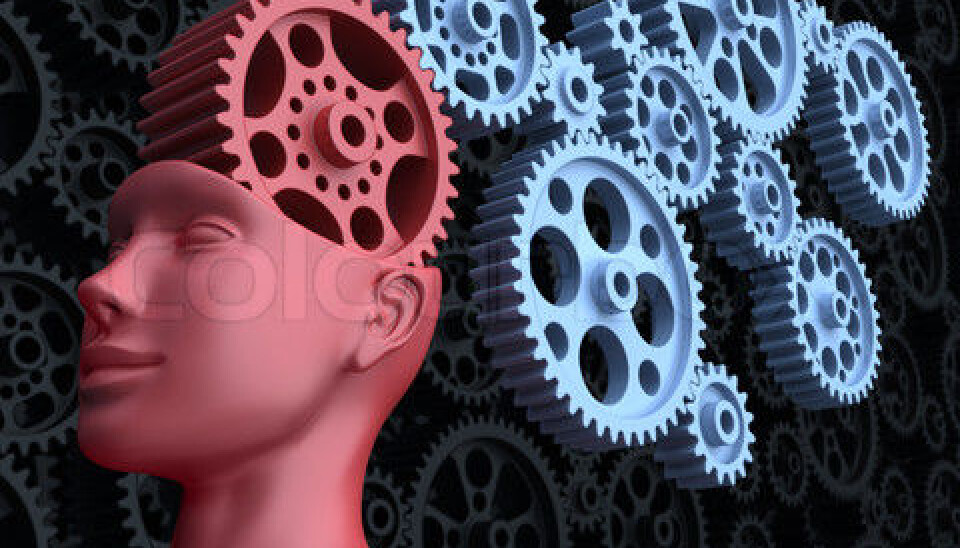
Faulty braking system leads to depression
New rat study reveals that the brains of depressive people are incapable of controlling the activity in certain brain areas – the innate braking system doesn’t work. The discovery could lead to new types of antidepressants.
Antidepressant drugs in the shape of SSRIs, such as Citalopram or Prozac, do not have the desired effect on all patients.
Science cannot really explain why this is so, and if fact not a lot is known about how these drugs actually affect our brains. Scientists generally have a limited understanding of why we actually get depressed in the first place.
But new, ground-breaking animal studies have made researchers a little wiser. The studies have revealed mechanisms that appear to play a role in the development of depression.
Nerve cells need to be under control
It has long been known that depression is caused by an imbalance in the brain’s neurotransmitter system, the function of which is to optimise the communication between the brain’s nerve cells, known as neurons.
Our goal is to develop new drugs that can function as an alternative to antidepressants, and which can be targeted to those patients who do not respond to SSRI. We are currently running some very exciting studies on that front.
Some neurotransmitters activate the neurons while others inhibit them. This can be compared to the accelerator and brake pedals in a car. These pedals balance the neuronal activity.
If the brain is healthy, it can push either of these pedals down as needed. But if it’s in a depressive state, at least one of the pedals is defective. And in order to get better, the faulty pedal needs to be repaired.
At Aarhus University in Denmark, a research team has carried out animal studies in which they provoked depressions in rats using a variety of tricks.
It’s known that the hippocampus region in the brain plays a key role in the development of a depression. By removing the animals’ brains and manipulating specific neurons in them, the researchers discovered a defective neurotransmitter, GABA, which is known to contribute to the control of the communication between two types of nerve cells, interneurons and granule cells.
“When the brake stops working, it’s the accelerator that takes over, and the consequence of this is that the granule cells go hyperactive,” says Kimmo Jensen, a professor of physiology and biophysics, who carried out the study together with project leader Ove Wiborg of Aarhus University.
“The hyperactive cells release the substance glutamate, which kill neurons. When a part of the brain cells in the area die, the hippocampus starts to shrink. And since the hippocampus is heavily involved in the generation of our emotions and memory, we develop a depression. We become sad and we have difficulties remembering things.”
It’s all about communication
The discovery was made during examinations of thin hippocampal brain slices from laboratory rats. Since the brain slices were still alive, the researchers were able to stimulate the nerve cells in various ways to determine whether they were functioning as they should or whether they were defective.
The stimuli consisted of small electrical shocks, strong enough to put the nerve cells’ brake pedal back into motion.
As expected, the healthy nerve cells responded to the shock by releasing sufficient amounts of GABA to put a damper on the activity provoked by the shock. The cells in the depressed animals, on the other hand, did not respond. Their braking effect was clearly reduced.
”According to our measurements, granule cells are more active in the depressed animals than they should be,” says Wiborg.
“This means that in the sick animals, the cells communicate more with other regions of the brain than they should. And it’s this hyperactivity that provokes cell death, which then leads to depression.”
Antidepressants repair the brake
At first, the researchers found themselves in a chicken-and-egg situation, as they couldn’t figure out whether it was the faulty brake that provoked a depression or whether it was the depression that came first and destroyed the GABA neurons.
But after having conduced further experiments, they now reckon it’s most likely that it is the faulty brake that provokes a depression.
When they gave antidepressants to the depressed rats, the GABA brake regained its power over the granule cells. The brain regions started communicating normally again and then the depression disappeared.
“What’s really interesting is that the brakes were repaired again when we gave citalopram to the rats,” says Jensen. “The problem, however, is that antidepressants have a limited effect. Only a few of the rats had their brake repaired and thus got rid of their depression. The rest remained ill. We’re hoping to explain in upcoming studies why the drug cannot help everyone.”
Great expectations for the braking system
Up to now, the general view has been that depression is mainly caused by neurons not receiving sufficient amounts of the neurotransmitter serotonin, which plays an important role in the regulation of our mood.
SSRIs such as citalopram and Prozac were originally developed to increase the amount of serotonin in the brain. In recent years, however, it’s become increasingly clear that this does not provide a full explanation. Other regions of the brain and other neurotransmitters are also involved in the development of a depression – a view that is supported by the discovery of the defective GABA brake.
The researchers are hoping that in the long run they will come to understand the brain’s built-in accelerator and braking system well enough to develop drugs that are targeted to repair it if it’s faulty.
The SSRI drugs that were originally targeted at the serotonin system appear in some cases to also be capable of repairing a defective GABA brake, but that’s not good enough because it only helps some patients.
”Our goal is to develop new drugs that can function as an alternative to antidepressants, and which can be targeted to those patients who do not respond to SSRI. We are currently running some very exciting studies on that front,” says Jensen.
Such drugs could in principle be targeted either to the accelerator or the braking system. But Kimmo Jensen believes the latter is more likely, since activating the accelerator system releases glutamate, which has harmful effects.
”I have been studying the braking system for many years, and we’re starting to understand its specific effects on the various brain regions. I’m starting to believe that this could pave the way for some exciting new treatment forms.”
For many years, sleeping pills have been prescribed to patients with anxiety, but the problem here is that it makes them drowsy. If, instead, we could target the brain’s built-in brakes, the patient might recover without the strong side effect.
----------------------------------
Read the Danish version of this article at videnskab.dk
Translated by: Dann Vinther












